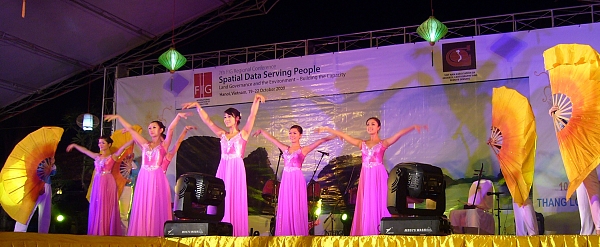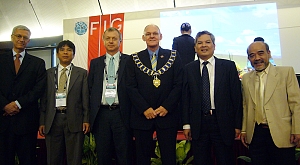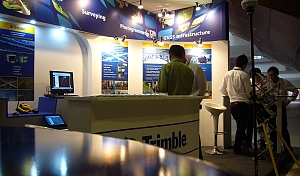|

7th FIG Regional Conference in Hanoi, Vietnam, 19-22 October
2009
Spatial Data Serving People -
Land Governance and the Environment - Building the Capacity
FIG Regional Conference focuses in Good Governance in Tenure
The 7th FIG Regional Conference titled “Spatial Data Serving People”
was held in Hanoi, Vietnam 19-22 October 2009. This was the second time that
the FIG regional conference was held in South East Asia. The conference was
organised jointly by FIG and the Viet Nam Association of Geodesy,
Cartography and Remote Sensing, VGCR. It gathered almost 400 participants
from 52 countries to discuss land and surveying issues.250 participants were
coming from Asia, South-East Asian region and overseas while about 150 were
coming from Vietnam.

The three themes of the conference were land governance; SDI and the
environment; and capacity building. Specific focus was on good governance in
tenure when this theme was strongly supported by the Regional Consultation
on Voluntary Guidelines for Responsible Governance of Tenure of Land and
other Natural Resources that the United Nations Food and Agricultural
Organization (FAO) organized for the Asian countries as a fully integrated
part of the regional conference. This two-day consultation attracted more
than 80 people from 15 Asian countries to discuss the FAO voluntary
guidelines.
Prof. Stig Enemark, FIG President addressed in his
opening address that "the design and building of appropriate land
administration systems is a big issue in most developing countries. Vietnam
and many other countries in the South East Asian Region are currently
working on projects to get these systems in place. I am very happy that we
will have the opportunity during this conference to get an overview of what
is going on in the region. As an outcome or legacy of this regional
conference in Hanoi we intend to develop a publication in line with previous
publications in the FIG series. This will focus on Land Acquisition in
Emerging Economies, which is identified as the key professional issue in the
region and there is a need for comprehensive guidelines to conduct these
processes."
The other presentations at the opening ceremony were given by Dr. Dang
Hung Vo, President of VGCR who welcomed participants after many years
preparations to Hanoi to the second FIG Regional Conference in the
South-East Asia region, the first was held in October 2004 in Jakarta,
Indonesia. Dr. Vo considered that conference was organised very timely
because of the big land related projects in the country. Also the topic of
land acquisition that has been selected as the topic for the Hanoi
Declaration is a crucial topic in Vietnam and in the region.
Dr. Mohamed El Sioufi, Head of Shelter Branch, UN-HABITAT and Mr.
Vu Ngoc Tien, Assistant FAO Representative for Vietnam, presented
their greetings to the conference. They were both very pleased on the
initiative of combining the FAO consultation on voluntary guidelines to the
FIG conference. The consultations were organised by FAO with strong support
from Global Land Tools Network and UN-HABITAT. The formal opening address
and keynote were given by Honourable Mr. Pham Khoi Nguyen, Minister
of Environment, Vietnam Government.
|

Speakers at the Opening Ceremony: Mohammed El Shioufi,
UN-HABITA,
Vu Ngoc Tien, FAO, Paul Munro-Faure, FAO, President
Stig Enemark, Minister Pham Khoi Nguyen and President
Dang Hung Vo, VGCR. |

The Regional Conference in Hanoi was a big success, special thanks
belong to sponsors and exhibitors: platinum sponsor: Trimble, gold
sponsor: MONRE and silver sponsors: ESRI and Intergraph. |
In the first plenary session on land administration Mr. Keith Bell
from the World Bank discussed the
key issues in land issues in East Asia in relation to six WB funded
projects that are worth of more than 180 million USD in 2009. His
conclusions included that land sector reforms are complex and cross-sectoral
and thus require broadly based development strategy that addresses the wider
social, economic, natural resources and environmental agenda. Land sector
reforms require long-term engagement, but governments with a record of good
governance and political will for reform are more likely to attract support.
Keith Bell's presentation is published as the
FIG Article of the
Month in November 2009. The other two presentations in the first plenary
session were presented by Dr. Paul Munro-Faure, Chief of the Land
Tenure and Management Unit, FAO who discussed
responsible governance of tenure and the FAO Voluntary Guidelines and
Mr. Ton Gia Huyen, Former Director General, General Department of
Land Administration who together with Mrs. Tran Thi Minh Ha,
Director, International Relation Department, MONRE explained
Land Administration in Vietnam, its past, recent and the future.
In the second plenary session on infrastructures for sustainable
environment Ms.
Jude Wallace
from Australia challenged the participants to re-think how
land acquisition policies should be linked to human rights and to find
the right tools to do so. This plenary session included also a presentation
on the climate change and its implications in Vietnam and the responses
Vietnam has been creating. Vietnam and the South-East Asian region are hit
with the natural disasters much more often than earlier as many unfortunate
cases has proved already during this year. It was stated that SDI must be
used as a tool for risk and vulnerability analysis and for preparing action
plans to prevent natural disasters and for preparations for early warning
and evacuation systems as well as for reconstruction and access to shelter,
water and food. These are all crucial for regions like South East Asia that
the strongly hit by the impacts of the climate change. This puts big demand
for political will and management responsibility as well as for responsive
professionals and organizations.
The last speaker in the second plenary session was Prof. Chris Rizos,
President Elect of IAG who discussed the
Importance of Geodetic Infrastructure. It should be mentioned that FIG
Commission 5 had a strong input in the conference programme with 11 own or
joint sessions. One of the objectives of
Commission 5 at this regional conference
was to support the Permanent Committee for GIS Infrastructure Asia-Pacific
(PCGIAP) initiative known as the Asia Pacific Reference Frame project or
APREF. This was one of the focus areas of the conference and preparation for
the
FIG Congress 2010 in Sydney in April
2010.
The theme of the third plenary session was capacity building. Prof.
Holger Magel, FIG Honorary President from Technical University Munich
challenged surveyors to establish a
Global Academic Partnership (GAP) with six targets for sustainable
development. FIG Vice President Teo CheeHai discussed the
code of ethics and urged FIG to revisit its ethical guidelines in
relation to the recent development in the world. The Vietnamese contribution
on this topic discussed
innovations in surveying and mapping training for an integrated world.
Technical programme in Hanoi included about 150 presentations in about
50 technical sessions and workshops. All FIG ten commissions contributed.
The concept of the regional conference proved to be well functioning with
good mixture of local and international presentations and good discussion.
The social events and visit to Ha Long Bay allowed excellent
opportunities for networking. The conference was made possible by the
financial support from the platinum sponsor
Trimble, gold sponsor MoNRE (Ministry of Natural Resources and
Environment) and silver sponsors ESRI and
Intergraph and all
exhibitors.
As outcome of the conference it was stated that knowledge transfer has to
involve all stakeholders which GLTN and FAO provide good examples. As
outcome from the conference the Hanoi Declaration on land acquisition in
emerging economies will be prepared and published before FIG Congress in
Sydney. This publication will identify the problems and issues related to
land acquisition in Vietnam and the South East Asia region, analyzes these
problems in the context of best practice, and provides guidelines and
recommendations and tools for good governance and practice. The summary of
the conferences is presented in the
closing address of President Stig Enemark.
At the FIG Council meeting new member associations were adopted from
Cyprus and Nepal and affiliate members from Afghanistan, Italy, Switzerland
as well as correspondents from Ethiopia and Eritrea as well as a new
corporate member from Portugal. The Council used most of the time for
preparations of the FIG Congress in Sydney, Australia in April 2010. The
Commission Officers meeting (ACCO) focussed on preparations of the technical
programme for Sydney where already about 800 proposals for presentations
have been submitted. The chairs elect discussed preliminary ideas for the
commission work plans for 2011-2014 for discussions with the national
delegates in Sydney.
More about the conference:
- Report of the FIG Regional Conference
-
Conference Proceedings
- List of Participants
- Report of FIG Commission 5
activities
- FAO Regional Consultation on the FAO Voluntary Guidelines on
Responsible Governance of Tenure of Land and Other Natural Resources
- Picture Galleries
- Keynote presentations:
- Opening Ceremony
- Plenary Session 1 - Land Governance and Land Administration
- Plenary Session 2 - Infrastructures for Sustainable Environment
- Plenary Session 3 - Capacity Building
- Closing Ceremony
- Report on the 7th FIG
Regional Conference in Hanoi at the Vietnam TV Headline News (50 MB)
Text in the news in English: "This evening in Hanoi, the Vietnam
Association of Geodesy, Cartography and Remote Sensing in cooperation
with the International Federation of Surveyors have opened the 7th FIG
Regional Conference. For this Regional Conference, the organizers have
selected main topics which include land administration and environment
management issues focused on construction of the Spatial Data
Infrastructure, analyses of related information, integrated planning of
land use, etc. under impacts of the climate changes. In this Regional
Conference, almost all delegates are interested in solutions on cutting
down the climate changes impacts. The Conference's recommendations are
concentrated in measures of the involuntary land acquisition which
ensure the sustainability in the process of economy development. NGOs
which participate in the Conference have willing to support Vietnam in
finding of projects, solutions dealing with the climate changes."
|

